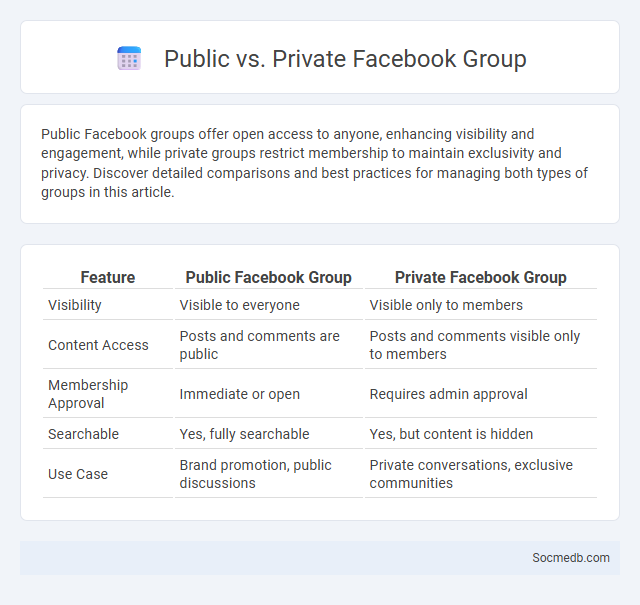
Photo illustration: Public vs Private Facebook Group
Public Facebook groups offer open access to anyone, enhancing visibility and engagement, while private groups restrict membership to maintain exclusivity and privacy. Discover detailed comparisons and best practices for managing both types of groups in this article.
Table of Comparison
| Feature | Public Facebook Group | Private Facebook Group |
|---|---|---|
| Visibility | Visible to everyone | Visible only to members |
| Content Access | Posts and comments are public | Posts and comments visible only to members |
| Membership Approval | Immediate or open | Requires admin approval |
| Searchable | Yes, fully searchable | Yes, but content is hidden |
| Use Case | Brand promotion, public discussions | Private conversations, exclusive communities |
Understanding Facebook Groups: Public vs Private
Facebook Groups serve as distinct communities where members share interests, with public groups allowing anyone to view posts and join freely, enhancing discoverability and open engagement. Private groups restrict membership and visibility, meaning only approved members can see content and participate, fostering a more secure and intimate environment. Choosing between public and private settings depends on privacy needs, group purpose, and desired interaction levels.
Key Features of Public Facebook Groups
Public Facebook Groups offer open access, allowing anyone to join, view posts, and participate in discussions, enhancing community engagement. They provide features like event scheduling, file sharing, and real-time notifications, fostering seamless communication among members. By leveraging these tools, you can build a vibrant network that encourages collaboration and information exchange.
Advantages of Private Facebook Groups
Private Facebook Groups offer enhanced privacy and control, allowing you to create a secure environment where members can share content without public exposure. These groups foster stronger community engagement through targeted discussions and exclusive access to specialized information or events. By limiting membership, you ensure that interactions remain relevant and personalized, boosting trust and active participation among members.
Privacy and Security: Which Group Type Wins?
Closed social media groups offer superior privacy and security compared to public or open groups because membership is restricted and content is visible only to approved members. These groups implement robust controls such as encrypted messaging, strict admin moderation, and customizable privacy settings to protect user data from unauthorized access. Businesses and communities seeking confidential interactions often prefer closed groups to safeguard sensitive information and maintain tighter digital security.
Engagement Patterns in Public vs Private Groups
Engagement patterns in social media vary significantly between public and private groups, with public groups often exhibiting higher content visibility but lower personal interaction levels. Private groups foster more intimate discussions and stronger member connections, leading to increased comment frequency and meaningful interactions. Your participation in private groups can enhance engagement quality by creating a trusted environment for open dialogue.
The Role of Facebook Comment Threads
Facebook comment threads serve as dynamic platforms for user interaction, fostering community engagement by enabling real-time discussions on diverse topics. These threads enhance content visibility through algorithmic prioritization based on user activity and relevance, which boosts organic reach and encourages deeper audience participation. By facilitating dialogue and feedback, Facebook comment threads function as critical tools for brand awareness, customer support, and influence in digital marketing strategies.
Visibility and Reach: Groups vs Comment Threads
Social media visibility and reach differ significantly between groups and comment threads, with groups offering a more targeted audience and higher engagement potential due to their focused membership. Comment threads, while often reaching a broader audience through public posts, tend to generate less sustained interaction and visibility over time. Leveraging groups can enhance content discoverability and foster niche communities, optimizing social media impact effectively.
Content Moderation Challenges
Content moderation on social media platforms faces challenges such as detecting harmful or inappropriate material at scale while balancing free speech rights. Advanced AI algorithms struggle with nuanced contexts, leading to false positives or negatives in flagging content. Human moderators often face psychological stress and inconsistent enforcement, complicating the development of fair and effective moderation policies.
Community Building: Group vs Thread Approaches
Social media community building thrives through both group and thread approaches, each offering unique engagement dynamics. Groups foster a sense of belonging by creating dedicated spaces for shared interests, encouraging ongoing interactions and deeper connections among members. Your choice between these methods should align with your goals for member interaction, whether seeking broad community collaboration or focused, topic-specific discussions.
Choosing the Right Option: Group Type or Comment Thread
Choosing the right social media interaction format depends on your communication goals and audience engagement style. Group types foster ongoing community discussions and deeper connections, ideal for collaboration and sharing diverse perspectives. Comment threads provide focused, real-time responses under specific posts, helping you manage conversations and maintain clarity in your content.
 socmedb.com
socmedb.com